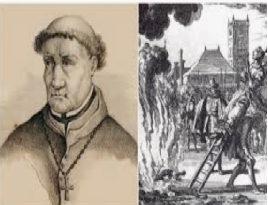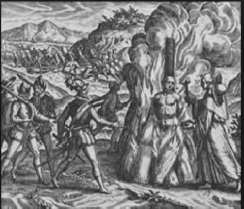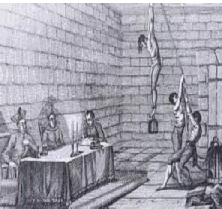|
PART 1 T O P I C |
|
|
|
|
|
|
|
|
|
|
|
|
|
|
|
|
|
|
|
CLICK BUTTON |
|
|
|
|
|
|
|
|
|
|
|
|
|
THE INQUISITION AND THE |
|
|
|
|
JewishWikipedia.info
One factor often ignored is the devastating impact which the Inquisition had on the basic economic life of Europe. The tragedy of seizing vast amounts of property is the most obvious but perhaps not even the worst part. Some occupations became suspect, such as map-making which was essential to navigation and trading.
Inquisitors regarded the printed word as a vehicle for heresy and so they seriously hampered communication. In addition, when a person was accused of heresy by the Inquisition, all of their debts became null and void. Because no merchant could be certain of the religious orthodoxy and reliability of another, it became difficult to trust others enough to allow them to go into debt to you. See Journeymen-Printers, Heresy, and the Inquisition in Sixteenth-Century Spain by Clive Griffin
The effect upon how people lived their lives was clear to all people - the Inquisition was not a secret affair by any means. In the 1490’s Juan de Mariana reported that people "...were deprived of the liberty to hear and talk freely, since in all cities, towns and villages there were persons placed to give information of what went on." Some people regard this time period as the "Spanish Inquisition" and claim that it existed more under the secular authority of King Ferdinand and Queen Isabella rather than the authority of the church.
But in fact, the Spanish Inquisition's most influential leader was the Dominican Monk Tomas de Torquemada, appointed Inquisitor General by Pope Sixtus IV and not a secular ruler. The reason that the leaders of the Spanish Inquisition persecuted the Jews and eventually called for their expulsion was the fear that they would contaminate Christians.
The Inquisition was not merely an expression of religious authority nor was it solely an instrument of social and political control....it was an arena where social and political cultures met and clashed on both shores of the Atlantic..... Persecuted groups whether Christianized Jews in Spain or native folk healers in the New World, were able to survive the Inquisition by strategies as diverse as preserving their experiences through literature and answering the need for medical care.
IMPACT AND LASTING SIGNIFICANCE OF THE INQUISITION
Encyclopedia.com
Because of the Inquisition's role in censorship, many have accused the institution of curbing scientific inquiry, dampening literary creativity, and even hindering economic growth. Historians now reject these charges. A few cases achieved notoriety in their day and continue to define the image of the Inquisition in the public's mind. Most infamous is the case of Galileo Galilei (1564–1642), who was summoned before the Roman Inquisition in 1632 to account for his public defense of the Copernican system, earlier deemed heretical by the church. He was condemned to perpetual house arrest and silence on the issue. For many, this trial epitomizes the conflict between scientific reason and free speech on the one hand, and religious fanaticism on the other. The philosopher Giordano Bruno (1548–1600) was not so lucky as Galileo; he was burned at the stake for his radical ideas about revealed religion and the possibility of an infinite universe with multiple worlds. In Spain, fear of religious experimentation led the inquisitors to target some of the leading mystics of the sixteenth century—St. Theresa of Jesus, St. John of the Cross, and Luis de León—although none was executed. Such cases, added to the Inquisition's role in censorship, the stream of Protestant propaganda directed against the papacy, and the Enlightenment's championship of basic freedoms, combined to create a lasting image of an arbitrarily cruel and inhumane institution. In the last twenty-five years, however, new scholarship has done much to mitigate the fearsome image of the Inquisition and to place the institution in its proper historical context. (Editors Note: No references are given as to what this research is. The last 40 years have seen the development of a revisionist school of Inquisition history, a controversial field of history whose purported aim is to re-examine the traditional history of the Inquisition.
The two most significant and extensively cited sources of the modern analysis concerning the conflicting narratives over the inquisitorial proceedings are ‘Inquisition’ (1988) by Edward Peters and ‘The Spanish Inquisition: A Historical Revision’ (1997) by Henry Kamen. These works focus on what their authors consider the exposure and the correction of histories that surround the inquisitions today. The alternative is ‘The Grand Inquisitor’s Manual, A History of Terror in the Name of God’ by Jonathan Kirsch, 2008 and ‘ The Origins of the Inquisition in Fifteenth Century Spain’ (1995/2002) by Benzion Netanyahu. It challenges the view that most conversos were actually practicing Judaism in secret and were persecuted for their crypto-Judaism. Rather, according to Netanyahu, the persecution was fundamentally racial, and was a matter of envy of their success in Spanish society.)
WAR AND INQUISITION:
REPRESSION IN EARLY MODERN SPAIN - ABSTRACT
Competitive Advantage in the Global Economy (CAGE).
Vidal-Robert, Jordi (University of Warwick), 2013
The Spanish Inquisition (1478-1834) lasted for more than three centuries and conducted more than 100,000 trials. Why would the Spanish Crown adopt this type of repressive institution? What were the actual motives of its activity? This paper explores the role of the Spanish Inquisition as a repressive tool of the Spanish Crown. When the Crown had to move military resources abroad to fight a war, the likelihood of an internal revolt against the Crown increased. To minimize the threat of rebellion, the Crown would use the Inquisition to increase repression (trials) in Spain. In a theoretical framework, I show that while the Inquisition would conduct more trials the higher the intensity of the wars fought abroad, it would however decrease its level of repression (trials) if the likelihood of an internal revolt were large enough. This behavior indicates an inverse-U relationship between inquisitorial and war intensity. To test this prediction, I assemble time series data for seven Spanish inquisitorial districts on annual trials of the Inquisition and wars conducted by the Spanish Crown between 1478 and 1808. I show that there is an inverse-U relationship between wars and inquisitorial activity. My results are robust to the inclusion of data on the severity of the weather (droughts) and to adjustments for spillover e.ects from districts other than the main district under analysis. Moreover, using a new database of 35,000 trials of the Inquisition, I show that religious persecution was especially significant during early stages of the Inquisition, while repressive motives better explain its behavior in later periods.
LONG-RUN EFFECTS OF THE SPANISH INQUISITION
- ABSTRACT
CAGE Online Working Paper Series
Vidal-Robert, Jordi (University of Warwick), 2014
Using a newly collected dataset on inquisitorial activity for seven regions, fourteen provinces and 947 municipalities, I analyze the long-term economic consequences of the Spanish Inquisition (1478-1834). I show that inquisitorial activity is negatively associated to regional and provincial economic growth (an increase of a thousand inquisitorial trials is associated with 3% to 5% lower urbanization rates). At the municipal level, I find that municipalities affected by the Inquisition experienced an annual population growth rate 0.11% lower than their counterparts. This result is robust when controlling for alternative explanatory factors, such as pre-existent religiosity and proxies for trade activity. I explore three channels through which the Inquisition may have had an impact on economic outcomes. While inquisitorial activity is not linked to levels of trust or social polarization, I find it is negatively associated with the adoption of new technologies and the creation of municipal centres of cultural transmission.
THE
INCREDIBLE
STORY OF THE JEWISH PEOPLE



IMPACT OF THE INQUISITION
ON THE BASIC ECONOMIC LIFE OF EUROPE
